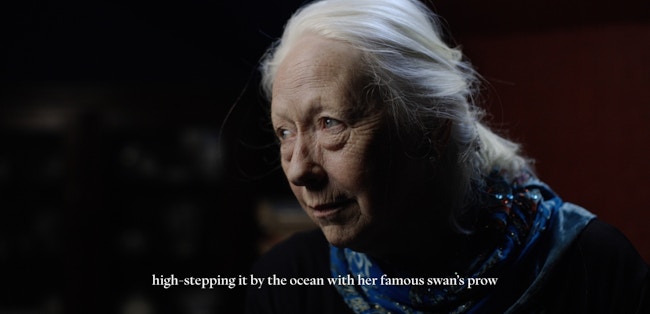Caitlín (Cathleen)
By Nuala Ní Dhomhnaill
Read by Marie Mullen
Ní fhéadfá í a thabhairt in aon áit leat,
do thabharfadh sí náire is aithis duit.
Díreach toisc go raibh sí an-mhór ina vamp
thiar ins na fichidí, is gur dhamhas sí an Searlastan
le tonntracha méiríneacha ina gruaig dhualach thrilseánach;
gur phabhsae gléigeal í thiar i naoi déag sé déag,
go bhfacthas fornocht i gConnachta í, mar áille na háille,
is ag taisteal bhóithre na Mumhan, mar ghile na gile;
go raibh sí beo bocht, gan locht,
a píob mar an eala, ag teacht taobh leis an dtoinn
is a héadan mar shneachta,
ní théann aon stad uirthi ach ag maíomh
as na seanlaethanta, nuair a bhíodh sí ag ionsaí
na dúthaí is an drúcht ar a bróga,
maidin Domhnaigh is í ag dul go hEochaill
nó ar an mbóthar cothrom idir Corcaigh agus Dúghlas.
Na rudaí iontacha a dúirt an Paorach fúithi
is é mar mhaor ar an loing. Is dúirt daoine eile
go mbeadh an Éirne ina tuilte tréana, is go réabfaí
cnoic. Murab ionann is anois nuair atá sí ina baintreach tréith
go raibh sí an tráth san ina maighdean mhómhar, chaoin, shéimh
is díreach a dóthain céille aici chun fanacht i gcónaí
ar an dtaobh thall den dteorainn ina mbítear de shíor.
Ba dhóig leat le héisteacht léi nár chuala
sí riamh gur binn béal ina thost, is nach mbíonn
in aon ní ach seal, go gcríonnann an tslat le haois
is fiú dá mba dhóigh le gach spreasán an uair úd
go mba leannán aige féin í, go bhfuil na laethanta san thart.
Cuirfidh mé geall síos leat nár chuala sí leis
mar tá sé de mhórbhua aici agus de dheis
gan aon ní a chloisint ach an rud a 'riúnaíonn í féin.
Tá mil ar an ógbhean aici, dar léi, agus rós breá
ina héadan. Is í an sampla í is fearr ar m'aithne
de bhodhaire Uí Laoghaire.
-
Cathleen
You can’t take her out for a night on the town
without her either showing you up or badly letting you down:
just because she made the Twenties roar
with her Black and Tan Bottom — O Terpsichore —
and her hair in a permanent wave;
just because she was a lily grave
in nineteen sixteen; just because she once was spotted
quite naked in Cannought, of beauties most beautied,
or tramping the roads of Moonstare, brightest of the bright;
just because she was poor, without blemish or blight,
high-stepping it by the ocean with her famous swan’s prow
and a fresh fall of snow on her broadest of broad brows —
because of all that she never stops bending your ear
about the good old days of yore
when she crept through the country in her dewy high heels
of a Sunday morning, say, on the road to Youghal
or that level stretch between Cork and Douglas.
There was your man Power’s ridiculous
suggestion when he was the ship’s captain, not to speak
of the Erne running red with abundance and mountain-peaks
laid low. She who is now a widowed old woman
was a modest maiden, meek and mild, but with enough gumption
at least to keep to her own
side of the ghostly demarcation, the eternal buffer-zone.
For you’d think to listen to her she’d never heard
that discretion is the better part, that our names are writ
in water, that the greenest slick will wizen:
even if every slubberdegullion once had a dream-vision
in which she appeared as his own true lover,
those days are just as truly over.
And I bet Old Gummy Granny
has taken none of this on board because of her uncanny
knack of hearing only what confirms
her own sense of herself, her honey-nubile form
and the red nose, proud rose or canker
tucked behind her ear, in the head-band of her blinkers.
Credits
Directed by Matthew Thompson.
Part of the second Coole Park Poetry Series, co-produced with Druid and curated by Colm Tóibín.
"Caitlín" and "Cathleen" reproduced by kind permission of the author, the translator and The Gallery Press, Loughcrew, Oldcastle, County Meath, Ireland from The Astrakhan Cloak (1992). Translated from the Irish by Paul Muldoon.
